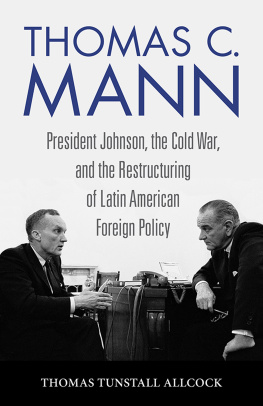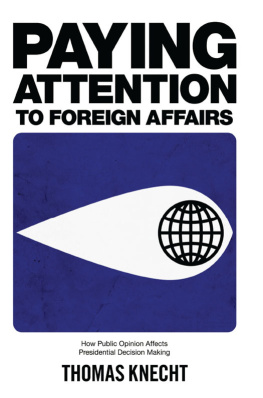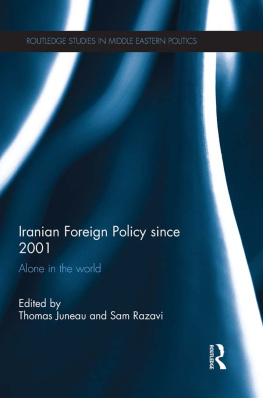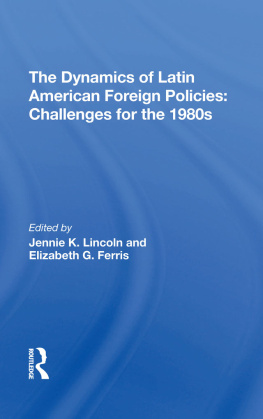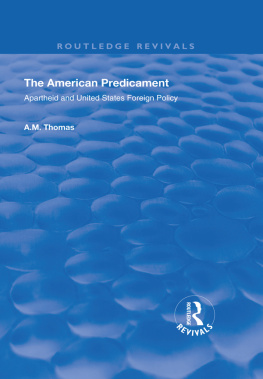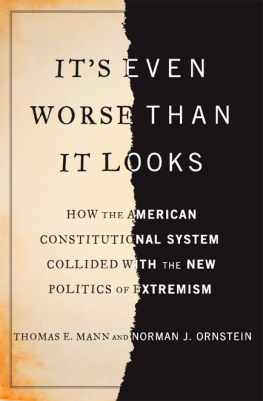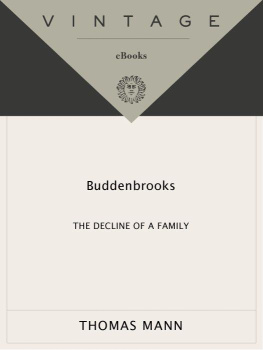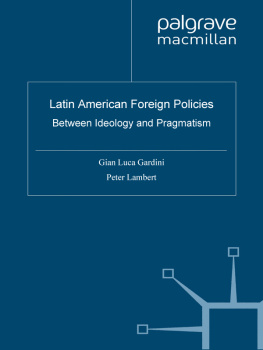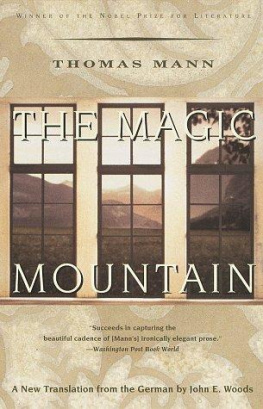THOMAS C. MANN
Due to variations in the technical specifications of different electronic reading devices, some elements of this ebook may not appear as they do in the print edition. Readers are encouraged to experiment with user settings for optimum results.
Copyright 2018 by The University Press of Kentucky
Scholarly publisher for the Commonwealth,
serving Bellarmine University, Berea College, Centre College of Kentucky, Eastern Kentucky University, The Filson Historical Society, Georgetown College, Kentucky Historical Society, Kentucky State University, Morehead State University, Murray State University, Northern Kentucky University, Transylvania University, University of Kentucky, University of Louisville, and Western Kentucky University.
All rights reserved.
Editorial and Sales Offices: The University Press of Kentucky
663 South Limestone Street, Lexington, Kentucky 40508-4008
www.kentuckypress.com
Library of Congress Cataloging-in-Publication Data
Names: Tunstall Allcock, Thomas, author.
Title: Thomas C. Mann : President Johnson, the Cold War, and the Restructuring of Latin American Foreign Policy / Thomas Tunstall Allcock.
Description: Lexington, Kentucky : The University Press of Kentucky, [2018] | Series: Studies in conflict, diplomacy, and peace | Includes bibliographical references and index.
Identifiers: LCCN 2018027841| ISBN 9780813176154 (hardcover : alk. paper) | ISBN 9780813176178 (pdf) | ISBN 9780813176161 (epub)
Subjects: LCSH: Mann, Thomas C. (Thomas Clifton), 19121999. | United StatesForeign relationsLatin America. | Latin AmericaForeign relationsUnited States. | United StatesForeign relations19631969. | Latin AmericanForeign relations19481980.
Classification: LCC F1418 .A47 2018 | DDC 327.7308092 [B]dc23
This book is printed on acid-free paper meeting the requirements of the American National Standard for Permanence in Paper for Printed Library Materials.
Manufactured in the United States of America.
| Member of the Association of University Presses |
Introduction
Lyndon Johnson, Thomas Mann, and Latin America
We have problems everywhere.
Thomas Mann to Lyndon Johnson, June 1964
On 11 April 1967, President Lyndon Baines Johnson made a rare foray outside the United States to spend three days in Punta del Este, Uruguay, attending a conference of American presidents. Six years previously, that same coastal resort town had been the location from which John F. Kennedys ambitious cooperative aid program, the Alliance for Progress, had been launched, yet Johnson hoped the meeting could be more than a celebration of his predecessors achievements. Having played a leading role in organizing the hemispheric summit, he pushed his aides to draft a wide-ranging series of proposals intended to launch a renewed and reinvigorated Alliance for Progress, focusing on regional economic integration through a common market and cooperative infrastructure projects. His public dedication to renewed efforts at hemispheric development would result in a rewarding trip, with constructive private and public meetings followed by a joint declaration that incorporated all his key proposals. The United States, he told the gathered presidents, was committed by history, by national interest, and by simple friendship to the cause of progress in Latin America.1
Unfortunately for Johnson, the struggles he would face in effectively implementing those proposals would ultimately demonstrate many of the fundamental challenges facing both inter-American relations in the 1960s and his own presidency. Indeed, the satisfying nature of the conference was a rare bright spot for a president widely perceived to have struggled in the arena of international diplomacy. The US delegation would return from Punta del Este to a Washington where the fallout from the disastrous conflict in Vietnam was already threatening to consume the administration and related clashes with Congress threatened the funding required for any new aid initiatives to succeed. By the time Johnson left office in January 1969, the promise of the 1967 conference of the presidents would appear but a minor footnote in a controversial and divisive presidency.
Assessments of Johnsons foreign policy record remain, on the whole, poor. One recent poll of scholars ranked his presidency a remarkable third overall for domestic leadership but a lowly thirty-second in foreign affairs, a legacy dominated by legislative achievements at home and the disastrous military campaign waged under his command in Vietnam.2 Despite highlights such as Punta del Este, assessments of his record in Latin America have typically done little to moderate such views. Notably, a clumsy intervention in the Dominican Republic in April 1965 and the related fallout support the impression of a president overly invested in notions of global credibility, one who overestimated the threat of Communist insurgencies, was hypersensitive to criticism, and was quick to seek military rather than diplomatic solutions to crises.3 Whereas Johnsons handling of Vietnam is often blamed in part on his overreliance on a cadre of like-minded advisers, his management of Latin American policy is usually linked to one particular individual, Thomas Clifton Mann. A long-serving Foreign Service officer from Texas appointed as Johnsons chief Latin American aide in December 1963, Mann is often assigned responsibility for overseeing disastrous diplomacy, such as in the Dominican Republic, and dismantling the Alliance for Progress. According to the Kennedy aide and historian Arthur Schlesinger Jr., Mann eviscerated the program.4

